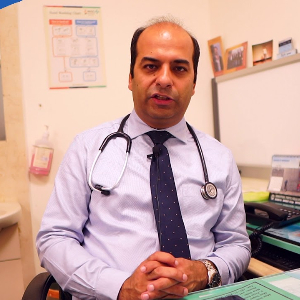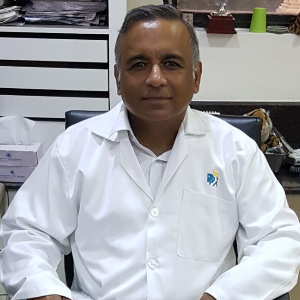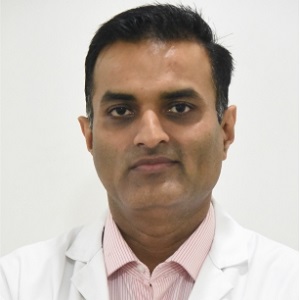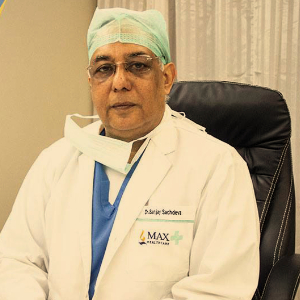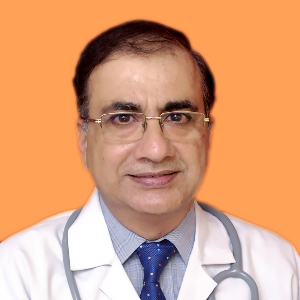Best Doctors in India for Alcoholic Hepatitis Treatment
- Obstetrician & Gynaecologist, New Delhi, India
- Over 40 years’ experience
Profile Highlights:
- Dr. Harmeet Malhotra is one of the best gynecologists in India to consult all major and complex gynecological surgeries, uterine bleeding, and cervical cerclage; in addition to the women’s general health checkups.
- Dr. Malhotra specializes in vaginal, abdominal, and Laparoscopic surgeries, as well as Hysteroscopy. She had her first Hysteroscopic surgery at Apollo Hospitals in New Delhi.
- Medical Oncologist, Gurugram, India
- Over 16 years’ experience
Profile Highlights:
- Dr. Ankur Bahl is a reputed medical oncologist in India.
- With over 16 years of experience, Dr. Bahl is considered for his expertise in treating Multiple Myeloma, Lymphoma, Leukemia, Gastrointestinal tumors, Gynaecological Tumors, Head, Neck, and Brain Tumors.
- Pediatric Orthopedic Surgeon, New Delhi, India
- Over 30 years’ experience
Profile Highlights:
- Dr. Ramani Narasimhan is a leading Pediatric Orthopedic Surgeon in Delhi and one of the best in India for the treatment of all kinds of pediatric orthopedic disorders.
- He specializes primarily in pediatric hip and spine surgery among other orthopedic procedures that include deformity correction surgery, joints, and bone repair and replacement, and surgery for sports injuries, fractures, and trauma. limb deficiency has been published in renowned national and international journals.
- Gastroenterologist, Gurugram, India
- Over 15 years’ experience
Profile Highlights:
- Dr. Pawan Rawal continued to work in PGIMER, Chandigarh after completing his DM for the next few years and gained proficiency in clinical Gastroenterology, Hepatology, and its application to patient care.
- He has performed several adults and pediatric upper G I endoscopies/ colonoscopies, ERCPs, capsule endoscopies, and push and double-balloon enteroscopy. Dr. Pawan Rawal is quite experienced in performing all kinds of therapeutic procedures.
- Obstetrician & Gynaecologist, New Delhi, India
- Over 25 years’ experience
Profile Highlights:
- Dr. Usha Kumar is a veteran Gynaecologist and Obstetrician with over 25 years of proficient experience.
- Having performed over 10,000 surgeries so far, Dr. Usha has also managed to establish herself as a top-notch gynecologist in India.
- Liver Transplant Surgeon and HPB Surgeon, New Delhi, India
- Over 33 years’ experience
Profile Highlights:
- Dr. Subhash Gupta is one of the finest Gastrointestinal and Liver Transplant Surgeons in the country. He has garnered an outstanding reputation in the field of Biliary, pancreas, and liver transplantation.
- He has conducted over 300 Living Donor Liver Transplants in the year 2013 each lasting 10-16 hours long.
- Dr. Subhash Gupta is also known to pioneer the development of Living Donor Transplant or LDLT.
- ENT Specialist, New Delhi, India
- Over 30 years’ experience
Profile Highlights:
- Dr. Sanjay Sachdeva is one of the most prominent ENT/ Otorhinolaryngologists in India with 30+ years of experience as a medical professional.
- He is currently working as the Senior Director in Max Super Specialty Hospital, New Delhi.
- Dr. Sanjay Sachdeva has received multiple awards and accolades for his incredible achievements in the field of Otorhinolaryngology.
- Rheumatologist, New Delhi, India
- Over 20 years’ experience
Profile Highlights:
- Dr. Prasan Deep Rath is one of the reputed Rheumatologists in India with 20+ years of proficient experience and has become one of the trustworthy names in the field of Rheumatology.
- He completed his MD in Internal medicine from Patparganj in Indraprastha Extension, Delhi, and is currently functioning as the Director and Head of the Rheumatology department at Max Super Speciality Hospital, one of the finest medical institutes in Delhi, India.
- Dermatologist, New Delhi, India
- Over 20 years’ experience
Profile Highlights:
- With over 20 years of professional experience, Dr. Nitin Walia is regarded as one of the top-notch dermatologists in India.
- He is currently functioning as the Senior Consultant of Dermatology and STD in Max Hospital, New Delhi.
- Dr. Walia is well known not only for his medical expertise but also as a reputed professor in his medical field thanks to his iron-clad academic background.
- Rheumatologist, New Delhi, India
- Over 30 years’ experience
Profile Highlights:
- Dr. Sundeep Kumar Upadhyaya is one of the best Rheumatologists in India, working at Indraprastha Apollo Hospitals, New Delhi.
- He has over 30 years of experience in modern medicine, spondylitis, rheumatology, arthritis, and other connective tissue disorder treatment.
- Dr. Upadhyaya has also been a crucial part of various research.
- He was one of the first rheumatology experts in India to introduce bioagents to treat rheumatoid arthritis, inflammatory spondylitis, and ankylosing spondylitis.
- Dr. Upadhaya provides training for PG students in Apollo Hospital, New Delhi.
Best Hospitals in India for Alcoholic Hepatitis Treatment
ALCOHOLIC HEPATITIS
Alcoholic hepatitis is a liver infection, which is mainly caused by frequent, heavy use of alcohol. Fat can build up in the liver cells, which might lead to inflammation as well as scarring of the liver.
Alcoholic hepatitis might be mild or severe. A patient might even need a liver transplant if proper treatment is not provided, or if they don’t stop consumption of alcohol.
It is also notable that all heavy drinkers don’t develop this condition, and sometimes this condition even develops in people who drink moderately. However, if you are diagnosed with this condition, it is important for you to quit drinking alcohol. People who continue drinking alcohol might face a huge risk of serious liver damage as well as death.
Symptoms
Depending on the amount of damage to the liver, the symptoms can vary. If you are having a mild form of the disease, you might not even experience any symptoms at all. However, as the damage continues to grow, you might experience the following:
- Changes in appetite
- Dry mouth
- Weight loss
- Pain or swelling in the abdomen
- Jaundice, or yellowing of the skin or eyes
- Fever
- Nausea and vomiting
- Easy bleeding or bruising
- Changes in your mental state, including confusion
- Fatigue
The symptoms of this condition are similar to those caused by a few other health conditions. Therefore, if you develop any of these symptoms, it is best to get a proper diagnosis as well as begin treatment.
Causes & risk factors
Alcoholic hepatitis generally develops when the alcohol you drink causes damage to your liver. However, it is not clear why alcohol does this damages only to some heavy drinkers.
Few factors that are known to play a role in this condition include:
- The body’s process that breaks down alcohol produces some toxic chemicals
- These chemicals can trigger inflammation that can destroy the liver cells
- Thus, over time, scars replace healthy liver tissue, thus interfering with the function of the liver
- This irreversible scarring, which is also termed cirrhosis, is the final stage of alcoholic liver disease
If you have hepatitis C and continue to drink, even moderately, you are more likely to develop cirrhosis.
Some heavy drinkers are also malnourished because they don’t eat a proper balanced diet. Alcohol and its byproducts also prevent the body from absorbing nutrition properly. Lack of nutrition can contribute to liver cell damage.
Some other risk factors that can lead to this condition include:
- Your sex- Women are usually at a higher risk of developing alcoholic hepatitis since the way alcohol is processed in women is different.
- Binge drinking- Having over five drinks within two hours for men and four or more for women can increase the risk of alcoholic hepatitis.
- Obesity- Heavy drinkers who are overweight are also more likely to develop alcoholic hepatitis and to progress from that condition to cirrhosis.
- Race and ethnicity- Hispanic and Negroid people might be at higher risk of alcoholic hepatitis.
- Genetic factors- According to studies, there may be a genetic component in alcohol-induced liver disease. However, it is difficult to separate genetic and environmental factors.
Diagnosis
If you are showing symptoms of alcoholic hepatitis, your doctor will first inquire about your medical history and alcohol consumption. Next, he/she will perform a physical exam to see if you have an enlarged liver or spleen. They might also need a few more tests to confirm your diagnosis, such as:
- Complete blood count (CBC)
- Liver function test
- Ultrasound of the liver
- Abdominal CT scan
- Blood clotting tests
In some cases, a liver biopsy might also be needed to confirm the diagnosis of alcoholic hepatitis. A liver biopsy requires your doctor to remove a tissue sample from your liver, which is then tested in the lab. This method helps to show the severity and type of liver disease.
Treatment
Stopping alcohol consumption is the most important treatment for alcoholic hepatitis. There is no cure for this condition, but treatment can help in reducing or eliminating symptoms, or stopping its progression.
It is also important to note that scarring of the liver is permanent, but treatment can aim to restore as much function as possible.
Dietary changes
Medication
Liver transplant
The best hope of recovery is to be aware of the signs and symptoms as well as to reduce, manage, or if possible, completely stop consumption of alcohol.
Complications
Alcoholic hepatitis might lead to severe other complications such as:
- Enlarged veins (varices)- In this condition, blood that is unable to flow freely through the portal vein, can back up into other blood vessels in your esophagus or stomach.
- Hepatic encephalopathy- This condition can be caused by the buildup of toxins if your damaged liver is unable to remove all the toxins from your body. It involves confusion, drowsiness, and slurred speech.
- Ascites- Ascites is a condition in which the fluid that accumulates in the abdomen may get infected and thus, require treatment with antibiotics. Although this condition is not life-threatening, it can be a sign of advanced alcoholic hepatitis, or cirrhosis.
- Kidney failure- A damaged liver affects blood flow to the kidneys, thus resulting in kidney failure.
- Cirrhosis- The scarring of the liver might lead to liver failure.
Prevention
Alcoholic hepatitis might be prevented if you take the following steps:
- Drink alcohol in moderation, if at all- For healthy adults, moderate drinking means no more than one drink a day for women of all ages and men older than 65, and not over two drinks a day for men aged 65 and younger. However, if you prevent all alcohol, it is a certain way to prevent this condition.
- Check before mixing medications and alcohol- Ask your doctor if it’s safe to drink alcohol while you are taking medications. Consider reading the warning labels on over-the-counter medications as well. Don’t drink alcohol when you are taking medications that warn of complications when combined with alcohol.
- Protect yourself from hepatitis C- Hepatitis C is an infectious liver disease that is caused by a virus. If it is left untreated, it may lead to cirrhosis. If you are having hepatitis C and you consume alcohol, you’re generally more likely to develop cirrhosis than if you don’t drink.


